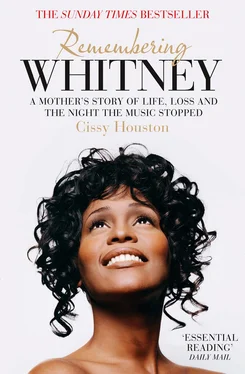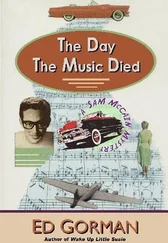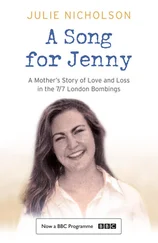I don’t know what I did or said after that. I was told later that I screamed so loudly that the whole building must have heard me, but my mind was absolutely blank, except for one thought: My baby was gone.
Somehow, people started showing up at my apartment. My niece Diane came, and other friends and family. The phone rang, the doorbell chimed, people brought food, people tried to hug me. But I just sat in my chair, crying. I was in shock, and even now, I really don’t know how I survived that evening—or the days that followed.
As soon as the news got out, all sorts of people surrounded my apartment building. Reporters lined the lobby trying to get in to ask questions, and strangers snuck up to my floor wanting to pay their condolences. The crowds got so thick outside the building that the police had to be called to keep people away. But I didn’t know any of that at the time, because all I could do was weep and moan and wail. All I wanted was to be left alone to grieve for my daughter.
The last time I’d seen Nippy, I had been a little upset with her. It was around the Christmas holidays, just six weeks or so earlier, and she’d suddenly showed up in New York with my granddaughter, Krissi. Nippy wanted me to come into the city and join them, and my sons Gary and Michael, but she hadn’t told me they were coming, so I’d made other plans. I was going up to Sparta, New Jersey, to have Christmas dinner with my friend Nell, and I didn’t feel right breaking it off, since we’d been planning it for a long time. I wanted to see Nippy, of course, but I just wished she would give me a little more notice when she was coming through.
So I went up to Sparta and spent the night there, and then the next day Nippy called me again, asking me to please come into New York and see them. She was staying at the New York Palace hotel, and Gary and Michael and their wives and children were all there, so it looked to be a nice family reunion. I went into Manhattan, excited to see the whole family together, which was a real rarity these days.
Nippy had just finished working on her new movie, Sparkle , and she looked fantastic. The whole day she was in good spirits—laughing and joking with her brothers, and playing with the kids. She’d always had a good relationship with her brothers, and as I watched them laughing together it felt like old times. We had all been through a lot in recent years, but this day it felt like we didn’t have a care in the world.
At one point in the day, as I was sitting on the sofa, Nippy leaned over and put her head in my lap. This was something she didn’t do all that often, but I always loved it when she did. She and I were very different people, and like any mother and daughter, we’d had our difficult moments over the years. But when Nippy would put her head in my lap, those were the moments that bonded us together, and I cherished them.
I knew Nippy was returning to Atlanta the next day, and I hated that our visit was so short. I was always asking her to come up and visit, as I hadn’t gotten to see very much of her in recent years. But now that she seemed to be in a better place, with her new movie and a new lightness about her, I hoped that would change. As I got ready to leave, Nippy and I stood talking at the door.
“I’ll come back soon, Mommy,” she said. “I’ve got to go to L.A. for the Grammys in February, but I’ll come see you after that.”
My daughter had come a long way from being a skinny little girl with a big voice growing up in Newark, New Jersey. She had traveled the world and become a sophisticated, powerful woman—but there was something in our relationship that always brought out the child in her. When I looked at Nippy, I saw the little girl who used to grab a broom and belt out songs in our basement studio like she was onstage at Carnegie Hall. And I saw the uncertain girl who wanted everyone to like her, who just wanted to sing to make people happy—not to sell millions of records or be a global superstar.
But she did become a superstar, and the pressures that brought eventually overwhelmed her. She endured so much, and was criticized so mercilessly by people who didn’t understand her—people who didn’t know who she was. She always used to say to me, “Mommy, I just want to sing.” Yet that would never be enough.
For everything Nippy went through, with drugs, with her relationships, with the pitfalls of fame, she really did seem to be on an upswing in the weeks before she died. During those weeks, whenever we spoke on the phone, she sounded so good, like she was feeling better than she had in years.
When she called me in early February, though, just before she left for Los Angeles and the Grammy Awards, she didn’t sound like herself. There was a sadness in her voice. Nippy never liked to share her problems with me—she was just private that way – so I didn’t know exactly what was wrong. We all have our ups and downs, so I didn’t worry too much about it. I knew she’d be busy in Los Angeles, with the awards and all the other events that went on, and I didn’t really expect to hear from her again while she was there.
But on the Friday before the awards, she did call me. She sounded a little better, though she still didn’t share much of what was going on. I don’t remember most of what we talked about, but I do remember the last thing she said to me on the phone. Back in December, she had promised to come see me after the Grammys, and before she hung up on that Friday, she said it again. “I’ll be home soon, Mommy,” she told me. “I promise.”
Those were the last words I would ever hear her speak.
The next day, Nippy died. And the days that followed were a seemingly endless blur of grief and pain. There were times when I didn’t think I could live through the despair of losing my baby girl. I just couldn’t believe I would never see her, or hear her voice, in this world again. I still can’t believe it.
But I did take solace in one thing. On that terrible day, when my doorbell kept ringing in those hours before Gary’s call, I believe it was my beautiful Nippy, keeping her promise to me—that somehow, some way, she came to see me, just as she said she would.
CHAPTER 2
A Child of Newark
It was a hot August night in 1963 when Nippy was born. I was doing session work as a background singer, and despite being overdue and big as all get-out, I’d worked a full day. My husband, John, picked me up at the studio in Manhattan and drove me home to our apartment in Newark, New Jersey, but not long after we walked in the front door, my water broke. So it was right back out the door as John put me in the car and hurried to Presbyterian Hospital.
From the moment I found out I was pregnant, I had hoped this baby would be a girl. I already had two boys, my sons Gary and Michael, and I knew this would be my last child. I was tired of having babies, and I surely didn’t want to go through what my mother had endured—she had eight children by the time she turned thirty. Three was enough for me, but I desperately wanted this last one to be a girl—although personally, I was convinced that I was about to have another big-headed boy. At that time, of course, you couldn’t find out until the baby was born. There were old wives’ tales about being able to tell depending on whether you carried the baby high or low, but nobody really knew.
What I did know was that this baby already seemed to love music. All during my pregnancy, I’d been doing session work—singing backup for artists such as Solomon Burke, Wilson Pickett, the Isley Brothers, Aretha Franklin, and my niece Dionne Warwick—and the whole time, that baby never stopped moving inside me. Sometimes, it even seemed to be moving to the music. So, one thing I knew for certain—that child was going to have rhythm!
Читать дальше












